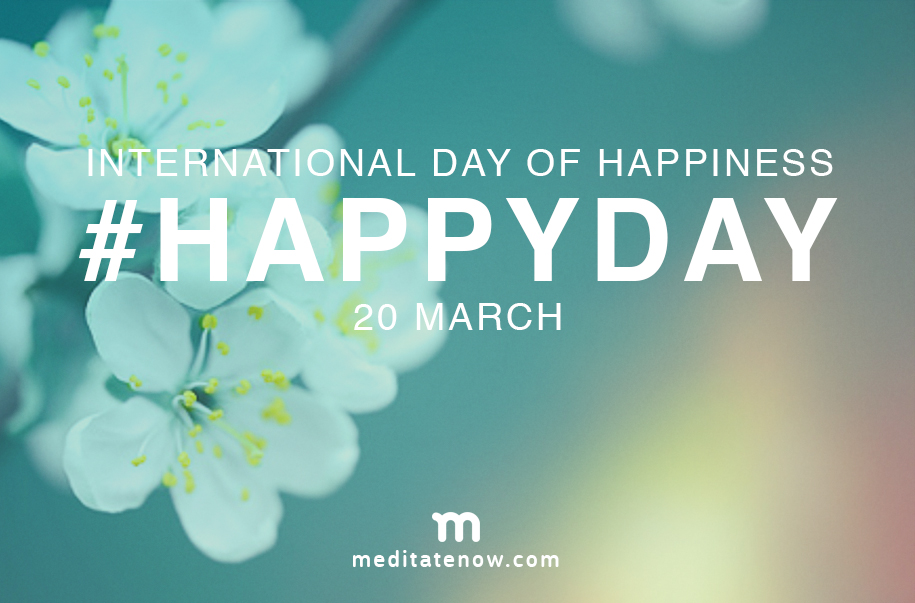
On International Day of Happiness, Pete Bartlett – Founder of Meditate Now – invites you to “join the campaign for a happier world” and shares seven ways meditation can make you happier
Today, Monday 20th March, marks the United Nations International Day of Happiness (IDOH), which is orchestrated by Action for Happiness, a global movement taking action for a happier, more caring world, fronted by The Dalai Lama (patron) and supported a roster of like-minded partner organisations.
IDOH comes hot on the heels of the launch of Meditate Now, the UK’s revolutionary new websearch facility for meditation and mindfulness classes and events. On 15th March, Meditate Now began its mission to make meditation more accessible and user-friendly to the digital generation, starting with London. A partner for IDOH 2017, Meditate Now was founded by experienced meditator Pete Bartlett, who last year became a facilitator for the renowned Action for Happiness course sharing practical tools to support those wanting to create more wellbeing in their lives and communities.
 Pete Bartlett says: “As emphasised on the International Day of Happiness website, ‘progress’ in today’s world should be as much about increasing our capacity as humans for happiness and wellbeing, as growing the economy. The main focus of this year’s International Day of Happiness is to inspire people to ‘join the movement for a happier world’, and to this end Meditate Now is highlighting the vital role meditation can play in cultivating happiness.
Pete Bartlett says: “As emphasised on the International Day of Happiness website, ‘progress’ in today’s world should be as much about increasing our capacity as humans for happiness and wellbeing, as growing the economy. The main focus of this year’s International Day of Happiness is to inspire people to ‘join the movement for a happier world’, and to this end Meditate Now is highlighting the vital role meditation can play in cultivating happiness.
“Having been meditating for 15 years, I can say that meditation has deeply enriched my life and made me a considerably happier person. Crucially it has shown me that lasting contentment does not come from looking for satiation and fixes outside of ourselves – the constant grasping for ‘more’ – be it more money, more beautiful things, more glamour, a better job, etcetera. Lasting contentment comes from finding peace and calm within ourselves, and meditation is a great tool for helping achieve that.”
Here are Pete Bartlett’s top seven ways meditation can make you happier:
- Alleviates Stress: Bombarded with advertising and overwhelmed by digital, many of us feel we’re stuck on a materialistic treadmill. Unsatisfied in our constant quest for “more” and exhausted from high pressure jobs and high octane lives, meditation is a tool to help you calm your busy mind, release anxious thoughts and relax. As the saying goes, “you can’t stop the waves, but you can learn to surf”.
- Improves Health: The many health benefits of meditation include lowering blood pressure, boosting the immune system, alleviating anxiety and depression, improving heart health and helping with IBS and skin conditions like psoriasis. Meditation is used to combat anxiety in schools, and by US marines to help with Post Traumatic Stress Disorder. Many doctors now recommend patients find a meditation class before prescribing medication.
- Helps you feel Grounded: By helping you step outside the habitual waves of mental agitation that come and go amid the emotional storms and challenges of modern life, meditation helps to anchor you in the present moment and feel more grounded and connected to yourself.
- Brings more Peace: Meditation can help create more peace, both within and outside yourself. Allowing more detachment from troublesome thoughts and emotions, you become less reactive and irritable. The more inner peace we have as individuals, the more peace we inspire in our communities.
- Improves Sleep: By generating more inner peace and calm and reducing mental chatter, Meditation helps you sleep much better: you can relax and let go of stress and tension more easily.
- Boosts Performance and Productivity: Meditation has been scientifically proven to thicken the brain’s cortex, increasing intelligence and enhancing cognitive thinking. Like a “mind gym”, Meditation improves our mental fitness; by clearing our minds of busy thoughts, our thinking becomes clearer and more focussed which in turn helps to improve concentration and memory.
- Enjoy Better Relationships: By helping us become less reactive and irritable and more accepting of day-to-day problems life throws at us, we become more tolerant and our relationships can dramatically improve. Quality relationships are an essential ingredient for a happy life.
